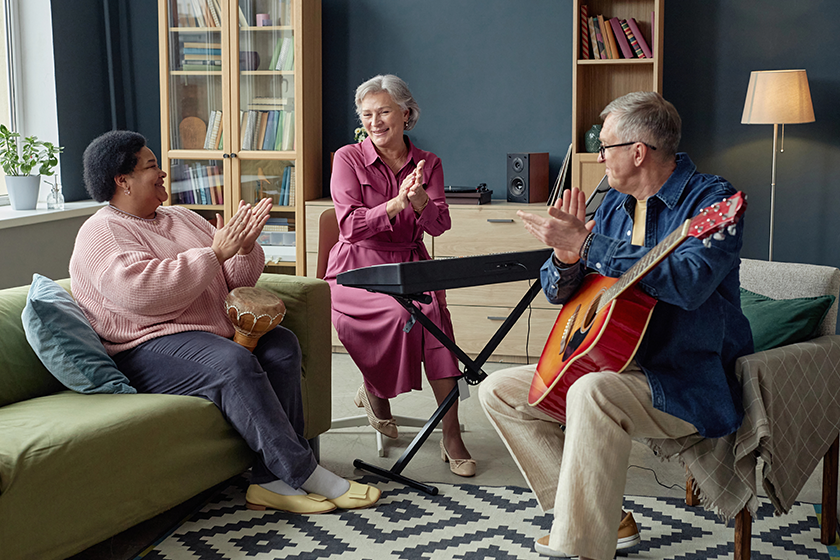Music has a special way of connecting us to memories and emotions, and this connection can be especially powerful for individuals with dementia. Choosing the right music and integrating it into daily life can provide comfort and joy. Through dementia music activities, you can help bring back positive memories, soothe agitation, and encourage social interaction for your loved one.
Select Familiar Songs To Evoke Positive Memories
Familiar songs can spark memories and create emotional connections for individuals with dementia. Choosing songs from a loved one’s past, especially from their younger years, can help trigger pleasant emotions and memories. These songs often hold personal significance and can serve as a way to communicate when words become difficult. Hearing a favorite melody can bring a sense of joy, helping residents feel connected to their surroundings. Music from movies, holidays, or special events in life can often evoke a strong, positive response.
Choose Music That Matches Loved One’s Preferences
Selecting music that aligns with your loved one’s preferences is key to enhancing their experience. It’s important to remember their favorite genres, artists, or specific songs. The music they enjoyed throughout their life will likely have the most positive impact, creating moments of recognition and familiarity. For example, if someone always enjoys classical music or jazz, playing those tunes can help reduce stress and create a sense of calm. Tailoring the playlist to match their tastes can foster a deeper connection and make the music sessions more meaningful.
Incorporate Gentle Movements To Enhance Engagement
Music can do more than just engage the mind—it can encourage gentle physical movement as well. Simple activities like clapping hands or tapping feet along with the rhythm can improve coordination and increase physical activity in a safe and fun way. For those who are able, gently swaying or small dance steps can be incorporated, offering an added layer of engagement. Physical movement tied to music has been shown to boost mood and reduce agitation, making it a valuable addition to any music-based activity.
Use Music To Create A Calming Atmosphere
Music can be a powerful tool to create a peaceful and soothing environment. Soft and slow-paced songs are effective at reducing anxiety and calming agitation, especially in individuals with dementia. Playing calming background music during stressful times, such as transitions between activities, can help maintain a peaceful environment. Classical music, instrumental tunes, or even nature sounds can help create a serene atmosphere. The right music helps foster relaxation, allowing residents to feel more at ease during their day-to-day routine.
Encourage Participation Through Simple Instruments And Rhythms
Introducing simple instruments like tambourines, maracas, or small drums can enhance participation and make music more interactive. Playing along to the rhythm of familiar songs can stimulate cognitive functions and encourage active involvement. Instruments that don’t require technical skill are ideal, allowing individuals with dementia to participate without frustration. Even light tapping or shaking can provide a sense of accomplishment. These hands-on activities offer a fun way to experience music, encouraging social interaction and improving mood.
Organize Group Music Sessions For Social Interaction
Group music sessions provide an opportunity for social interaction and bonding between residents. Singing familiar songs together or playing instruments in a group setting can foster a sense of community. Sharing music in a group helps individuals with dementia feel connected to others, reducing feelings of loneliness. Participating in a group music session encourages teamwork and mutual enjoyment, creating a space where everyone can engage. These gatherings also offer a break from daily routines, bringing moments of joy and relaxation to residents.
Adjust Volume And Tempo To Suit Comfort Levels
It’s important to keep volume and tempo in mind when planning music-based activities. Loud music or fast-paced songs can sometimes be overwhelming for those with dementia. Choosing a comfortable volume and slowing down the tempo of certain songs ensures a pleasant listening experience. Soft and slow rhythms are generally more calming, whereas louder or more intense music can cause agitation. Being mindful of how your loved one responds to the music allows you to create a peaceful, enjoyable atmosphere that promotes relaxation.
Observe Reactions To Tailor Future Music Activities
Every person with dementia responds differently to music, so it’s important to observe their reactions and adjust future activities accordingly. Some may respond positively to certain genres, while others might prefer specific instruments or rhythms. Paying attention to nonverbal cues like facial expressions, body language, or relaxation can help guide future music selections. Continually refining your approach based on these observations will ensure that the music activities remain meaningful and enjoyable, providing lasting benefits for your loved one.
Discover the Power of Dementia Music Activities in Our Retirement Community
At our retirement community, we know how impactful dementia music activities can be for older adults with memory-related conditions. Our compassionate team incorporates these activities into daily routines, creating joyful moments for residents. By focusing on familiar songs and gentle engagement, we help loved ones experience the emotional and physical benefits of music. Our dementia care program provides personalized support, using music to enrich the lives of our residents. Come visit us and explore how our community can offer a caring environment for your loved one’s needs.







